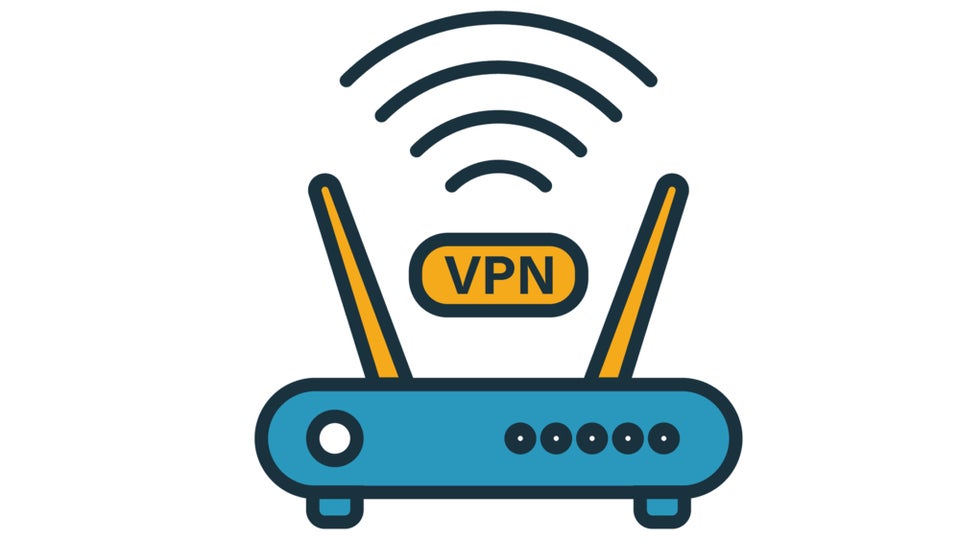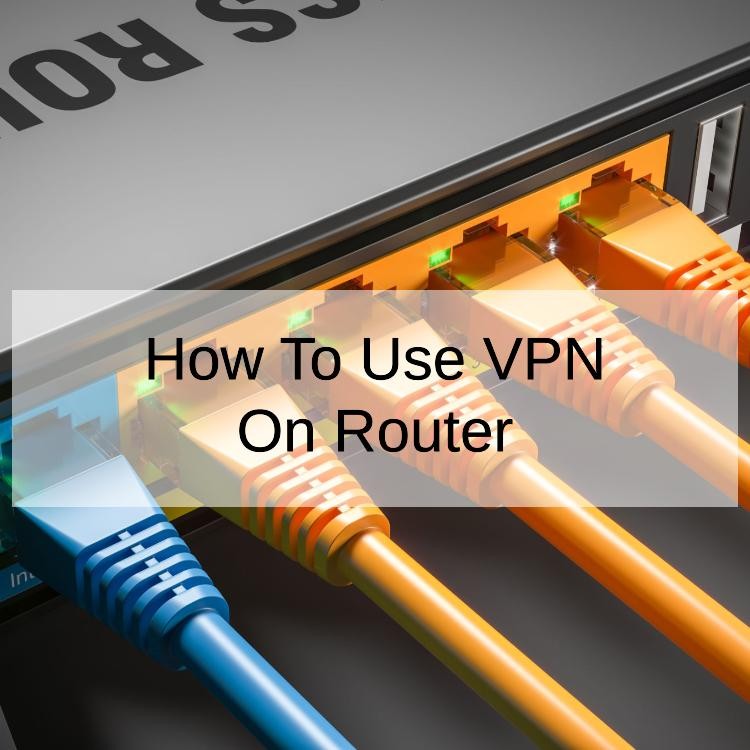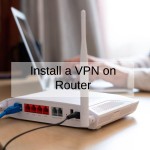In today's interconnected world, where cyber threats loom large and privacy concerns abound, safeguarding your online activities has never been more crucial. While using a Virtual Private Network (VPN) on individual devices provides a layer of protection, extending VPN coverage to your entire network through your router offers enhanced security and privacy for all devices connected to the internet. In this comprehensive guide, we'll explore the ins and outs of using VPN on your router, from understanding the basics to implementing it effectively, ensuring that your digital footprint remains secure and private.

Using VPN on Router
What is VPN on Router?
A VPN on a router extends the benefits of a VPN to all devices connected to your home or office network. By configuring your router to use a VPN connection, you encrypt all internet traffic passing through the router, providing enhanced security and privacy for every device, from smartphones and laptops to smart TVs and IoT devices.
Why Use VPN on Router?
There are several compelling reasons to use VPN on your router:
- Network-wide Protection: VPN on router encrypts all traffic, ensuring that every device connected to the network is protected.
- Secure IoT Devices: Many IoT devices lack robust security features. Using a VPN on the router safeguards these devices from potential vulnerabilities.
- Bypassing Geo-Restrictions: With VPN on router, you can bypass geo-restrictions and access region-locked content on any device.
- Privacy and Anonymity: VPN on router masks your IP address and encrypts your data, preserving your anonymity and privacy online.
Grab Incredible Deals Today on Shurfshark
Understanding VPN Download for Router
Choosing the Right VPN Provider
Selecting a VPN provider compatible with router setup is crucial. Look for providers offering router-compatible vpn download, robust encryption protocols, a wide server network, and excellent customer support. Popular VPN providers like ExpressVPN, NordVPN, and Surfshark offer router-compatible VPN services.
Downloading VPN Configuration for Router
Once you've chosen a VPN provider, download the VPN configuration files or setup instructions provided by the provider. These files contain the necessary settings and credentials required to configure your router to use the VPN connection.
Exploring the Best Free VPN for Router
Advantages of Free VPN for Router
Free VPNs can be appealing for those on a budget, but they come with limitations. Advantages include cost-effectiveness and ease of setup. However, free VPNs often have data caps, slower speeds, and fewer server locations compared to their paid counterparts.
Get More, Spend Less at Nord VPN Today!
Choosing the Best Free VPN for Router
When selecting a free VPN for your router, prioritize providers with reliable performance, transparent privacy policies, and no-logs commitments. Some reputable free VPN options include ProtonVPN, Windscribe, and TunnelBear.
Setting Up VPN App on Router
Benefits of Using VPN App for Router Setup
Using a VPN appsimplifies the setup process and allows you to manage your VPN connection more conveniently. VPN apps offer user-friendly interfaces, automatic updates, and additional features like kill switches and split tunneling.
Step-by-Step Guide to Installing VPN App on Router
- Log in to your router's admin panel.
- Access the VPN section and enter the configuration details provided by your VPN provider.
- Save the settings and connect to the VPN server.
- Confirm the connection status and test the VPN to ensure it's functioning correctly.
Configuring VPN Gateway on Router
Importance of VPN Gateway
The VPN gateway serves as the entry and exit point for your VPN connection. Configuring the VPN gatewayon your router is essential for establishing a secure connection to the VPN server and encrypting all network traffic passing through the router.
Limited-Time Offers: Grab Your Private VPN Deals Today!
Steps to Configure VPN Gateway on Router
- Access the router's admin panel and navigate to the VPN settings.
- Enter the VPN gateway address provided by your VPN provider.
- Configure additional settings such as VPN protocol, authentication method, and encryption.
- Save the settings and establish a connection to the VPN server.
Exploring VPN Online Services for Router
Advantages of VPN Online Services
VPN online services offer a convenient alternative to manual router configuration. These services allow you to configure and manage your VPN connection through a web interface, eliminating the need for complex router setup procedures.
Comparison of VPN Online Service Providers
Popular VPN onlineservice providers include ExpressVPN, NordVPN, and CyberGhost. These providers offer user-friendly interfaces, extensive server networks, and robust security features for router users.
Free Download of VPN for Router
Overview of Free VPN Download Options
Some VPN providers offer vpn free download specifically designed for router setup. These free VPN options typically come with limitations such as data caps, slower speeds, and fewer server locations compared to premium plans.
Recommendations for Reliable Free VPN Downloads
When downloading a free VPN for your router, prioritize providers with transparent privacy policies, strong encryption, and a commitment to user privacy. ProtonVPN, Windscribe, and TunnelBear are popular choices for free VPN download for routers.
Accessing VPN App Download for Router
Guide to Downloading VPN Apps for Router Setup
To vpn app download for your router, visit the website of your chosen VPN provider and navigate to the downloads section. Select the appropriate app for your router model and follow the on-screen instructions to download and install the app.
Alternative Methods for Downloading VPN Apps on Routers
If your router does not support native VPN app installation, you can use alternative methods such as flashing custom firmware like DD-WRT, Tomato, or OpenWrt, which offer built-in VPN support.
Understanding VPN Applications for Router
Definition and Functionality of VPN Applications
VPN applications for routers offer a convenient way to configure and manage your VPN connection without the need for manual setup. These applications typically feature user-friendly interfaces, automatic updates, and additional security features.
Different Types of VPN Applications
There are various types of VPN application available for routers, including native router firmware with built-in VPN support, VPN-specific router firmware like DD-WRT and Tomato, and VPN client apps that can be installed on compatible routers.
Exploring Free VPN Options for Router
Overview of Free VPN Options for Router
Free VPNs for routers offer a cost-effective solution for securing your network, but they come with limitations such as data caps, slower speeds, and fewer server locations. However, they can still provide basic security and privacy protection for your devices.
Advantages and Limitations of Free VPNs for Router
Advantages of free VPNs for routers include cost-effectiveness and ease of setup. However, limitations such as data caps, slower speeds, and fewer server locations may impact performance and user experience.
Recommendations for the Best Free VPNs for Router
When selecting a best free VPNfor your router, prioritize providers with transparent privacy policies, strong encryption, and a commitment to user privacy. ProtonVPN, Windscribe, and TunnelBear are popular choices for free VPNs for routers.
Advantages of Using VPN on Router
- Enhanced Security and Privacy VPN on router encrypts all internet traffic passing through the router, providing network-wide protection for all devices connected to the network.
- Bypassing Geo-Restrictions With VPN on router, you can bypass geo-restrictions and access region-locked content on any device connected to the network, regardless of its location.
- Secure IoT Devices Many IoT devices lack robust security features. Using a VPN on the router safeguards these devices from potential vulnerabilities and cyber threats.
Benefits of Using VPN on Router
- Network-wide Protection VPN on router encrypts all traffic passing through the router, ensuring that every device connected to the network is protected from potential threats and surveillance.
- Secure Internet Connections VPN on router provides a secure and encrypted connection to the internet, safeguarding your data from interception and eavesdropping by hackers, ISPs, and government agencies.
- Privacy and Anonymity VPN on router masks your IP address and encrypts your data, preserving your anonymity and privacy online, and preventing third parties from tracking your online activities.
Step-by-Step Guide to Using VPN on Router
- Preparing the Router for VPN Configuration Before configuring the router for VPN usage, ensure that it is compatible with VPN setup and has the necessary firmware installed.
- Selecting and Downloading a Compatible VPN Choose a VPN provider compatible with router setup and download the necessary configuration files or setup instructions from the provider's website.
- Configuring VPN Settings on the Router Access the router's admin panel, navigate to the VPN settings, and enter the configuration details provided by your VPN provider. Save the settings and establish a connection to the VPN server.
- Connecting Devices to the VPN Once the VPN is configured on the router, connect your devices to the router as usual. All internet traffic passing through the router will now be encrypted and routed through the VPN server.
Tips for Optimizing VPN Performance on Router
- Choosing the Right VPN Protocol Select the appropriate VPN protocol based on your security and performance requirements. Options include OpenVPN, IKEv2, L2TP/IPsec, and PPTP.
- Selecting the Best VPN Server Locations Choose VPN server locations strategically to optimize performance and bypass geo-restrictions. Select servers that are geographically close to your physical location for faster speeds.
- Updating Router Firmware and VPN Software Regularly update your router's firmware and VPN software to ensure compatibility, stability, and security. New updates may include bug fixes, performance improvements, and security patches.
- Monitoring Network Traffic and Performance Monitor network traffic and performance regularly to identify any issues or anomalies. Use built-in router tools or third-party monitoring software to track bandwidth usage, latency, and connection speeds.
- Troubleshooting Connectivity Issues If you encounter connectivity issues or performance problems, troubleshoot the router and VPN connection. Check router settings, restart the router and modem, and contact your VPN provider's support team for assistance if necessary.
How to Set Up Use VPN on Router
Setting up and using VPN on your router is a relatively straightforward process that can be accomplished in a few simple steps:
Choose a Compatible Router: Not all routers support VPN functionality. Ensure your router is compatible or consider purchasing a router with built-in VPN support.
Select a VPN Provider: Choose a reputable VPN provider that offers router-compatible VPN services. Consider factors such as encryption protocols, server locations, and customer support.
Download VPN Configuration Files: Once you've chosen a VPN provider, download the necessary configuration files or setup instructions from their website.
Access Router Settings: Log in to your router's admin panel using your web browser and enter the required credentials.
Configure VPN Settings: Navigate to the VPN section of your router's settings and input the configuration details provided by your VPN provider. This typically includes the server address, username, password, and encryption protocol.
Save Settings and Connect: Save the configuration settings and establish a connection to the VPN server. Once connected, all internet traffic passing through the router will be encrypted and routed through the VPN tunnel.
Best VPN Right Now
When it comes to choosing the best vpn freefor router usage, several factors should be considered:
Security Features: Look for VPN providers offering robust encryption protocols, kill switches, and DNS leak protection to ensure your data remains secure.
Server Network: Opt for VPN providers with a wide range of server locations to bypass geo-restrictions and access content from around the world.
Speed and Performance: Choose VPN providers known for their fast connection speeds and reliable performance to minimize buffering and latency issues.
Compatibility: Ensure the VPN provider offers router-compatible VPN services and provides clear instructions for setup and configuration.
Customer Support: Select VPN providers with responsive customer support teams to assist with any technical issues or troubleshooting.
Easy Way to Install Use VPN on Router
Installing and configuring VPN on your router doesn't have to be complicated. Here's an easy way to get started:
Choose a Compatible Router: Select a router that supports VPN functionality. Popular router brands like Asus, Netgear, and Linksys offer models with built-in VPN support.
Select a VPN Provider: Choose a reputable VPN provider that offers router-compatible VPN services. Research different providers and select one that meets your specific needs and requirements.
Download Configuration Files: Once you've chosen a VPN provider, download the necessary configuration files or setup instructions from their website.
Access Router Settings: Log in to your router's admin panel using your web browser and enter the required credentials.
Configure VPN Settings: Navigate to the VPN section of your router's settings and input the configuration details provided by your VPN provider. This typically includes the server address, username, password, and encryption protocol.
Save Settings and Connect: Save the configuration settings and establish a connection to the VPN server. Once connected, all internet traffic passing through the router will be encrypted and routed through the VPN tunnel.
Configuration Use VPN on Router
Configuring VPN on your router involves several key steps:
Access Router Settings: Log in to your router's admin panel using your web browser and enter the required credentials.
Navigate to VPN Settings: Locate the VPN settings section within your router's settings menu.
Enter Configuration Details: Input the configuration details provided by your VPN provider, including the server address, username, password, and encryption protocol.
Save Settings: Save the configuration settings and apply them to your router.
Establish Connection: Once the settings are saved, establish a connection to the VPN server. Your router will now encrypt all internet traffic passing through it.
Automatic Configuration Use VPN on Router
Automatic configuration of VPN on your router simplifies the setup process:
Download VPN App: Some VPN providers offer dedicated router apps that automate the configuration process. Download the app from your VPN provider's website.
Install App on Router: Follow the instructions provided by your VPN provider to install the app on your router. This typically involves uploading the app's firmware to your router.
Enter Credentials: Once installed, enter your VPN credentials into the app's settings menu.
Enable Automatic Connection: Enable the automatic connection feature within the app's settings menu. This ensures that your router will automatically connect to the VPN server whenever it's powered on.
Manual Configuration Use VPN on Router
Manual configuration allows for greater customization:
Access Router Settings: Log in to your router's admin panel using your web browser and enter the required credentials.
Navigate to VPN Settings: Locate the VPN settings section within your router's settings menu.
Enter Configuration Details: Input the configuration details provided by your VPN provider, including the server address, username, password, and encryption protocol.
Customize Settings: Customize additional settings such as encryption protocol, DNS settings, and split tunneling options to suit your preferences.
Save Settings: Save the configuration settings and apply them to your router.
Establish Connection: Once the settings are saved, establish a connection to the VPN server. Your router will now encrypt all internet traffic passing through it.
Why and When to Use Use VPN on Router
Using VPN on your router offers several benefits:
Network-wide Protection: VPN on router encrypts all internet traffic passing through the router, providing enhanced security and privacy for all connected devices.
Bypassing Geo-Restrictions: With VPN on router, you can bypass geo-restrictions and access region-locked content on any device connected to the network.
Secure IoT Devices: Many IoT devices lack robust security features. Using VPN on the router safeguards these devices from potential vulnerabilities and cyber threats.
Anonymity and Privacy: VPN on router masks your IP address and encrypts your data, preserving your anonymity and privacy online.
Enhanced Security: VPN on router protects your network from potential threats such as hackers, malware, and surveillance by ISPs and government agencies.
Why Should You Use Use VPN on Router
There are several reasons why using VPN on your router is beneficial:
Comprehensive Protection: VPN on router extends the benefits of VPN to all devices connected to your network, providing network-wide protection against cyber threats and surveillance.
Convenience: Once configured, VPN on router requires no additional setup on individual devices, making it a convenient solution for securing your entire network.
Bypassing Restrictions: VPN on router allows you to bypass geo-restrictions and access region-locked content on any device connected to the network, regardless of its location.
Secure IoT Devices: VPN on router protects IoT devices with limited security features from potential vulnerabilities and cyber attacks.
Anonymity and Privacy: VPN on router masks your IP address and encrypts your data, ensuring your online activities remain private and anonymous.
Facts on how to use a vpn on a router
Here's a detailed comparison of how to use a VPN on a router across various aspects
Setup Process:
- Manual Configuration: Most routers support VPN client functionality, requiring manual configuration through the router's web interface. Users need to input VPN server details, authentication credentials, and encryption settings.
- Pre-installed Firmware: Some routers come with pre-installed VPN firmware, simplifying the setup process. Users typically need to select their VPN provider, enter credentials, and configure settings through the router's interface.
Device Compatibility:
- All Connected Devices: Using a VPN on a router extends protection to all devices connected to the network, including smartphones, tablets, computers, smart TVs, gaming consoles, and IoT devices.
- Compatibility Challenges: Older routers or those with limited processing power may struggle to handle VPN encryption for all connected devices, leading to reduced performance.
Security:
- Network-wide Encryption: VPN on a router encrypts all outgoing and incoming traffic, enhancing overall network security and privacy.
- Single Point of Vulnerability: If the router's security is compromised, all connected devices are potentially exposed. Regular firmware updates and strong router security practices are essential.
Performance:
- Speed Reduction: VPN encryption typically imposes some speed reduction due to added overhead. The impact varies depending on factors like router hardware, VPN protocol, and server location.
- Potential Bottlenecks: Older or low-end routers may experience performance bottlenecks when encrypting traffic for multiple devices simultaneously.
Geographic Access:
- Bypassing Restrictions: VPN on a router allows users to bypass geo-restrictions imposed by streaming services, websites, or online services. This is particularly beneficial for accessing content not available in certain regions.
- Server Availability: The effectiveness of bypassing restrictions depends on the VPN provider's server coverage and the ability to access servers in desired geographic locations.
Ease of Use:
- Simplified Management: Once configured, using a VPN on a router requires minimal ongoing maintenance. Users don't need to individually configure VPN settings on each device.
- Initial Configuration Complexity: Setting up a VPN on a router can be more complex than configuring it on individual devices, especially for users unfamiliar with router settings and VPN protocols.
Supported Protocols and Features:
- Protocol Support: VPN routers typically support popular VPN protocols like OpenVPN, PPTP, L2TP/IPsec, and IKEv2/IPsec. Advanced features such as split tunneling and kill switches may also be available depending on the router and firmware.
- Compatibility Check: Users should ensure their chosen VPN provider supports the protocol and features compatible with their router to maximize functionality.
VPN Provider Compatibility:
- Wide Compatibility: Most VPN providers support router configurations, but the specific setup process may vary. Users should consult their VPN provider's documentation or support resources for guidance.
- Router Limitations: Some routers may have limitations on supported VPN protocols or encryption standards, potentially restricting compatibility with certain VPN providers.
In summary, using a VPN on a router offers comprehensive network-wide security and privacy benefits but requires careful consideration of setup complexity, performance implications, and compatibility with both the router hardware and chosen VPN provider. Users should weigh these factors to determine if using a VPN on their router aligns with their needs and technical capabilities.
How to Get a Use VPN on Router
Getting started with VPN on your router is easy:
Choose a Compatible Router: Select a router that supports VPN functionality or consider purchasing a router with built-in VPN support.
Select a VPN Provider: Choose a reputable VPN provider that offers router-compatible VPN services.
Download Configuration Files: Download the necessary configuration files or setup instructions from your VPN provider's website.
Configure VPN Settings: Log in to your router's admin panel, navigate to the VPN settings, and input the configuration details provided by your VPN provider.
Save Settings and Connect: Save the configuration settings and establish a connection to the VPN server. Your router will now encrypt all internet traffic passing through it.
Using VPN on your router is a powerful tool for enhancing security, privacy, and anonymity online. By encrypting all internet traffic passing through the router, VPN ensures that every device connected to the network is protected from potential threats and surveillance. Whether you're concerned about safeguarding sensitive data, bypassing geo-restrictions, or securing IoT devices, VPN on router offers a comprehensive solution for protecting your digital footprint. Follow the steps outlined in this guide, select a reputable VPN provider, and configure your router to use VPN for network-wide protection and peace of mind. Take control of your online security and privacy today with VPN on router.
Commonly Asked Questions and Answer
Q What is a VPN router, and why would I use one?
Answer: A VPN router is a router that has VPN client capabilities, allowing it to establish a secure connection to a VPN server. Using a VPN router offers network-wide protection, bypasses geo-restrictions, and enhances privacy for all devices connected to the network.
Q How do I set up a VPN on my router?
Answer: Setting up a VPN on your router typically involves accessing the router's web interface, navigating to the VPN settings, and inputting the VPN server details provided by your VPN provider. You'll need to configure the VPN protocol, server address, authentication credentials, and encryption settings.
Q Can I use any router with a VPN?
Answer: Most routers support VPN client functionality, but it's essential to check if your router model is compatible with your VPN provider and supports the necessary VPN protocols. Some routers may require manual firmware updates or third-party firmware installations to enable VPN support.
Q What are the benefits of using a VPN on my router?
Answer: Using a VPN on your router encrypts all incoming and outgoing network traffic, providing enhanced security and privacy for all connected devices. It allows you to bypass geographic restrictions, access region-locked content, and protect your online activities from surveillance or data interception.
Q Will using a VPN on my router affect my internet speed?
Answer: Using a VPN on your router may result in some speed reduction due to the encryption process and the distance to the VPN server. The impact on speed depends on various factors such as router hardware, VPN protocol, server load, and your internet connection's bandwidth.














